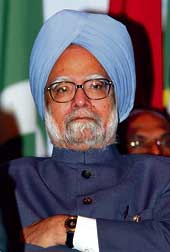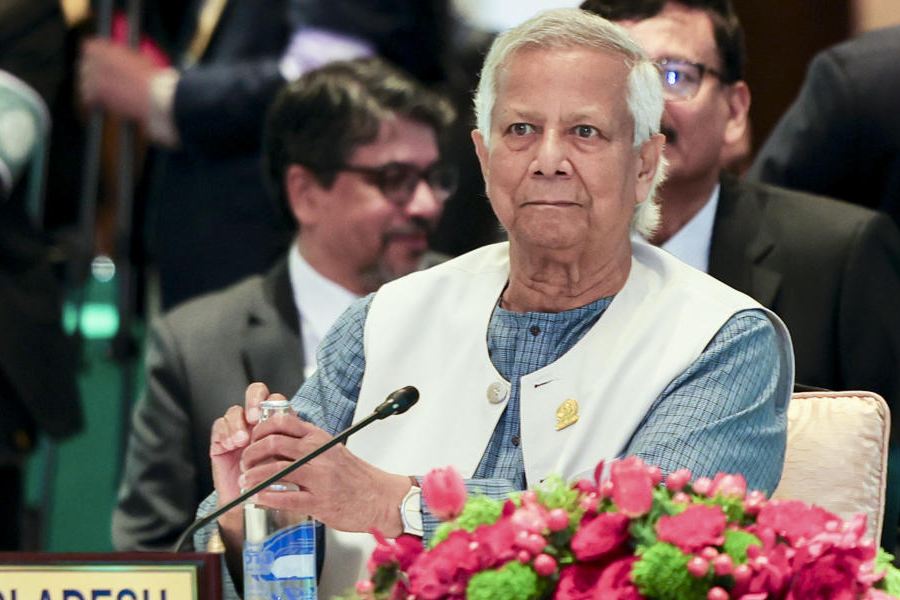 |
| Manmohan Singh in Kampala on Friday. (PTI) |
Kampala, Nov. 23: The Manmohan Singh government may have avoided high-profile diplomatic initiatives with Pakistan on the lines of Vajpayee’s famous bus journey to Lahore or his hosting of the Agra summit, but the quiet shift towards a “pragmatic” engagement with President Pervez Musharraf was evident once again today.
India merely “noted” the decision of the Commonwealth “to suspend Pakistan forthwith from the Councils of the Commonwealth, pending restoration of democracy and the rule of law in the country”.
The decision, taken by the nine-member Commonwealth Ministerial Action Group (CMAG) late last night, was formally endorsed by the Commonwealth Heads of Government (CHOGM) at the first day of its three-day summit which began here today.
The summit which was inaugurated by Queen Elizabeth today is being attended by Prime Minister Singh, one of the 53 heads of state who have arrived here to discuss a range of issues including “inclusive globalisation” and climate change.
Although India is a key member of the Commonwealth and has the highest stakes in what unfolds in neighbouring Pakistan , it decided to stay aloof from today’s decision.
Replying to questions at a briefing later this evening, foreign secretary Shivshankar Menon also indicated that the Commonwealth decision would not affect India’s bilateral engagements with Pakistan .
The terse official reaction of the Commonwealth decision to suspend Pakistan merely said: “We have noted the decision of the CMAG. Our hope remains that Pakistan will return to stability and democracy as soon as possible.”
Asked why India had merely “noted” the decision and not taken a more concrete stand on it, Menon said: “We were not called upon to take a position. We are not a member of the CMAG. Frankly, it is not for us to take a position.”
He also clarified that the Commonwealth decision did not affect bilateral relations between individual members of the grouping with suspended Pakistan. It only meant that Pakistan had been suspended from all inter-governmental Commonwealth activities.
This was done in the case of Fiji and in the case of Pakistan too after the October 12, 1999, coup which brought Musharraf to power for the first time.
Although today’s suspension order did not spell it out, Pakistan may not be allowed to participate in the 2010 Commonwealth Games in Delhi unless the suspension is revoked well before then.
India’s insistence today that it had no role to play in the suspension decision because it was not part of the CMAG underlines the foreign policy establishment’s nuanced approach to dealing with Pakistan, ministry sources later indicated.
In 1999, for instance, India had played a much more pro-active role in pushing for Pakistan’s suspension even though it had not been a member of the CMAG then either.
But things have changed since then and the “pragmatic” school — which prefers “realpolitik” over “high democratic principles” — has acquired an upper hand.
This has been evident, in recent weeks, in India’s approach to both Pakistan and Myanmar, sources pointed out.
India has chosen to remain focused on the gains to be had from bilateral engagement with military dictatorships on either side of her borders. While calling for both governments to restore democracy, India has not come out strongly against the crackdown against the Opposition in either Pakistan or Myanmar .
At the same time, the Commonwealth decision today is a source of quiet satisfaction to India, the sources said.
The decision was a follow-up to the warning issued by the CMAG on November 12 when it had urged the government of Pakistan to repeal emergency provisions, restore the Constitution and independence of judiciary, release political party leaders and activists, remove all restrictions on the media, create conditions for the holding of free and fair elections and ensure that President Musharraf stepped down as army chief “as promised”.
The CMAG statement today noted that “notwithstanding some progress by the Pakistan government since its last meeting (November 12), the situation in Pakistan continued to represent a serious violation of the Commonwealth’s fundamental political values” and decided to suspend it once more.
MEA sources here said the decision to suspend Pakistan was pushed by the smaller nations of the Commonwealth who felt it would not be right to have “double standards” on the issue of democracy — wherein African and Pacific nations such as Zimbabwe or Fiji faced international strictures but others were allowed to get away. The nine members of CMAG are Malta, Lesotho, Sri Lanka, Tanzania, UK, Canada , Malaysia, St Lucia and Papua New Guinea .
Malaysia and Sri Lanka were not as hostile to Pakistan but had to fall in line with the general consensus, sources said.
For India, it was a “win-win” situation – the suspension would go down well with Musharraf’s critics who have taken to the streets over the last nine months to push for democracy and help India’s overall support for democracy in that country. At the same time, by not playing an active role in taking action against Pakistan , India ’s engagement with the Pakistani regime on crucial questions such as cross-border terrorism can continue apace which is of much greater value in the current scheme of things, sources indicated.
Eom











